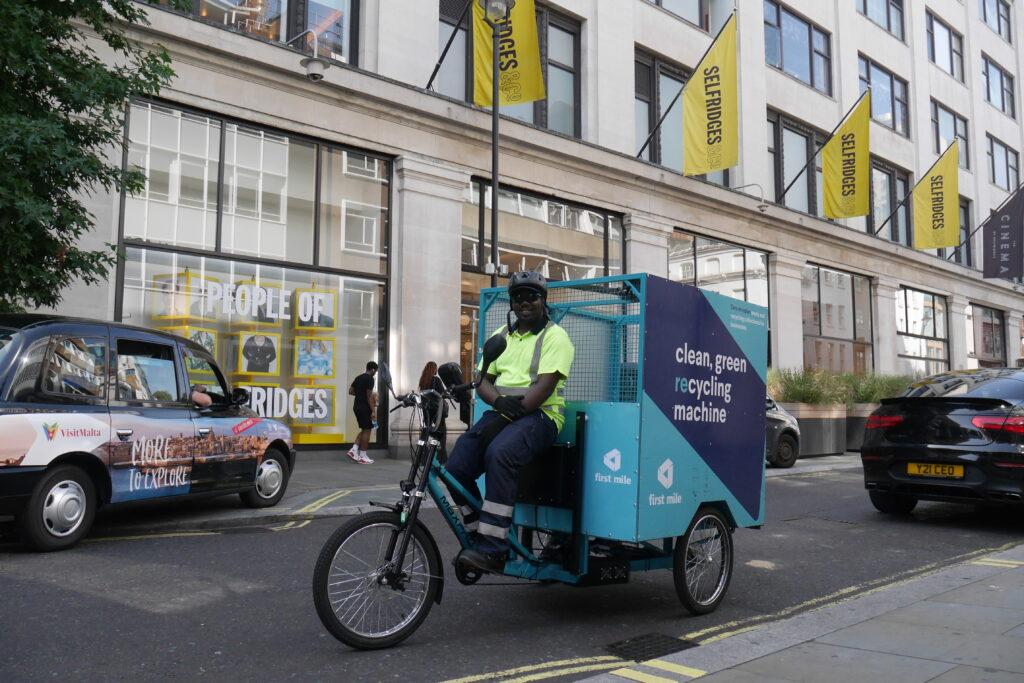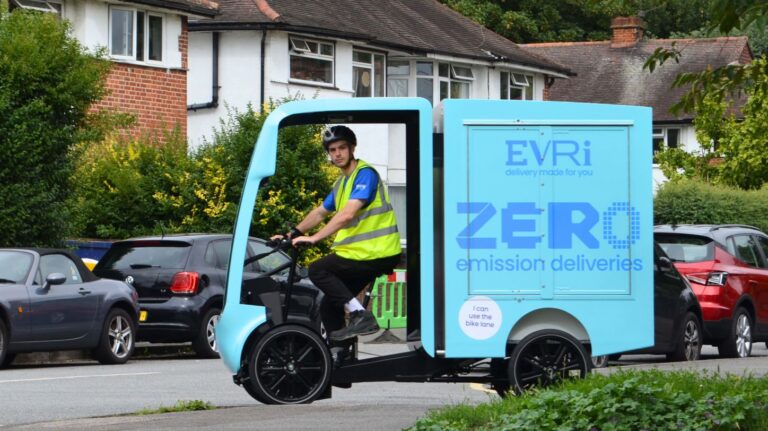How sustainable last-mile solutions are transforming parcel delivery and waste collection in urban centres…
In a post-pandemic world, the demand for convenient, efficient and immediate last-mile services remains an enormously vital yet lucrative market. Standing to gain hugely from last-mile innovations, both the parcel delivery and waste collection sectors have begun implementing various technologies to enhance their services.
Market research company Apex Insight estimates that the British waste collection industry is worth £9.1bn annually, while the London Environment Strategy estimates that the bill for waste collection in the UK capital alone is at £2bn per year and rising. For packages, this economic value is even greater, Statista reports that more 3.6 billion packages were delivered across the UK in 2023 – an increase of 800 million packages on pre-pandemic levels – with the associated courier services worth £12.8bn.
As the UK government reaffirms its commitment to a greener and cleaner Britain in line with its Net Zero 2040 targets, the need for energy-efficient last-mile delivery options has risen concurrently. To solve these problems and manage the sheer quantitative service demand, many companies have implemented micromobility options to improve delivery efficiency.
Relatively cheap, carbon neutral and able to access harder-to-reach areas for larger vehicles, electric cargo (e-cargo) bikes have seen the widest deployment. Although petrol and diesel vehicles such as vans and internal combustion engine (ICE) bikes still dominate the market, companies operating in dense urban areas are increasingly introducing e-cargoes into their fleets to handle escalating demand.
UK environmental and waste management company First Mile are one such organisation to have introduced e-cargo bikes to collect waste in areas it had previously deployed HGVs. “Each time we deploy two bikes, we’re removing a compactor from the road because two bikes have the capacity to have as much volume as one HGV,” explains First Mile senior strategy associate Fanny Bianovici. “We compared the bikes’ embedded carbon to the emissions emitted by HGVs through diesel consumption and we’re saving 50,000kg per bike, or 550,000kg of carbon for the total project.”
FAST FACT: 10% of all cargo traffic in London could be shifted to bikes. Source: TfL & Cross River Partnership
Waste-collection HGVs also contribute significantly to light and noise pollution as they navigate densely populated areas, collecting refuse at a slow pace. E-cargo bikes can therefore be operated 24/7, should the need arise, and despite their lower carrying capacity, can be deployed in fleets able to make multiple trips.
“It’s better for traffic as well because the bikes don’t sit in traffic as long as trucks would,” Bianovici continues, “they’re also quicker than HGVs as it can take up to two hours to get a truck to the customer. The bikes can also go into smaller streets, which makes waste collection easier for us and disposal easier for the customer.”
For parcel delivery companies, the advantages of operating fleets of nimble e-cargo bikes in compact city environments are amplified. Evri, whose 20,000 couriers delivered an estimated 720 million packages in 2022, view expanding its e-cargo fleet as vital to fulfilling an ever-expanding service quota.
Tight margins
Despite comprising 30% of all bike sales in 2021, according to the Bicycle Association, and being well suited for rapid delivery, uptake of e-cargo bikes for commercial use has been relatively slow across the UK. As part of the UK government’s commitment to Net Zero 2040, funds have been made available to expedite business uptake.
Initially made available across England on 30 July 2021, the e-cargo Bike Grant Fund invited organisations to apply for 40% of the total cost of an e-cargo bike, with a maximum of £2,500 for two-wheel models and £4,500 for three-wheel models. Applicants were able to opt for up to five bikes per organisation and were also able to submit joint ‘high-street’ applications for shared e-cargo bikes.
“The sad thing is that, in 2024, the cheapest and most effective way of delivering a parcel is on a dirty diesel. We need to break that mould and we’re fighting hard to do it” – Alan Dickinson, head of courier operations – south, Evri
Following the successful completion of the £400,000 national e-cargo Bike Grant Fund 2021/22, an additional £300,000 was made available to applicants in the following year. A combination of these funds, grants and increased propensity for cycling during-and-post-pandemic saw some 112,429 e-cargo units sold in 2022. However, the German Bicycle Industry Association (ZIV) estimates that Germany (the European leader of e-bike production and sales) sold 850,000 units in 2023 – a decline of 12% on the previous year.
Head of courier operations – south at Evri, Alan Dickinson, speaks of the difficulty of implementing e-cargo bikes on a larger scale. “Honestly, it is expensive, [but] my job is to work out how we can do this in a way that not only supports our carbon reduction ambition but also means our couriers are earning enough money at a reasonable rate of pay.”
He adds: “The sad thing is that, in 2024, the cheapest and most effective way of delivering a parcel is on a dirty diesel. We need to break that mould and we’re fighting hard to do it.”
Evri’s busiest week saw 3.5 million parcels delivered, which means the sheer volume of deliveries currently requires the company to rely on its fleet of internal combustion engine (ICE) vehicles in the absence of adequate numbers of e-cargo bikes – regardless of government incentives. ICE delivery vehicles also far outweigh the carrying capacity of e-cargoes, while the largest waste-collection HGV operates at 17 tonnes compared to the largest e-cargo used by First Mile, which carries 200kg. Until those margins are reduced, either by increasing the capacity, frequency or number of e-cargo bikes, the cost-effectiveness of larger ICE vehicles further disincentivises transition.

“[The volume of waste] can’t be too large as the bikes can only take up to 60 sacks a load,” explains Bianovici of First Mile’s challenges. “If the customer has more than that, the bike must make multiple loads. We also must source new consolidation sites in central London, brownfield sites that are currently unused. We’ll turn them into something that’s helping the environment.”
The logistical and financial challenges delaying the full transition from ICE vehicles to e-cargo bikes are further compounded by labour shortages – the exacting nature of delivery work fostering a global culture of unsustainable employee turnover. HGV drivers, who by comparison to e-cargo riders are better paid and incentivised, are themselves suffering to meet replacement requirements.
Job agency Driver Require reports that the UK suffered an HGV driver shortage in 2022 as the number of under-30s (the age group associated with sustainable industry growth) declined by 18,000 drivers. In the USA, Amazon delivery driver turnover reached an astonishing 150% as 350,000 workers passed through its vehicle’s doors in 2021, reports The New Yorker. Attracting, galvanising and maintaining an employee base is vital to the continuation of e-cargo schemes.
Bianovici details First Mile’s own difficulties retaining workers in the highly competitive courier market, and how the company works to improve rider retention: “We’ve had a high turnover rate due to the nature of the job, it’s hard work. It’s also easier to retain riders in the summer when it’s warm rather than when it’s cold and wet in the winter, naturally.
“We’ve been training fresh people but also bringing people in from different sectors of our workforce if they’d like the opportunity – such as loaders that would accompany the HGVs. Our riders stick with us because we have a contract, not many other similar businesses provide them with the security of a contract. They have paid leave, the full package as an employee in addition to using indoor conservation sites where they can rest.”
Going the distance
From humble beginnings, e-cargo-powered last-mile schemes possess transformative potential for companies seeking to improve their micromobility efficiency. According to Transport for London’s Cargo Bike Action Plan, London could replace 1-2% of van kilometres across Greater London by 2025, a number that could double by 2030. The same report’s high-end estimates suggest that 17% of van kilometres could be replaced in Central London, rising to 30% in the City of London.
Factors such as increased congestion, the prevalence and economic benefits of supportive policies, restrictive ICE vehicle regulations and increased retail and employment density, are expected to facilitate business transition. New or expanding city initiatives such as clean air zones, where ICE vehicles are heavily restricted, could also potentially catalyse e-cargo scale-up operations, providing the capital needed to purchase vehicles.
But for businesses seeking to scale-up today, how are current policies affecting their plans? Evri’s Dickinson explains why the immediate mass rollout of e-cargoes remains a difficult proposition: “E-cargo bike manufacturers are relatively small manufacturers. The lead times on them are anything between eight and 20 weeks. If you want 50 bikes, that’s 10 or 20 per month coming through. But we are committed as a business to invest.
“With scale it gets easier because anything with scale does. Naturally, as we get bigger on this, other carriers will as well. The actual cost of the bike, the manufacturing will reduce.”
Evri currently deploys bikes in Bristol, Edinburgh, Oxford, Cambridge and Colliers Wood in southwest London, with plans to expand when more e-cargoes come into commission. The company’s biggest deployment in Bristol registers an average 800 parcels delivered per day with 80-100 deliveries per bike.
While Evri maintains this number could rise to 150-200 parcels per bike, any increase is contingent on increasing productivity, through capacity or the speed of bikes. In the UK, commercial e-cargoes have a maximum speed of almost 10mph, higher-powered category bikes (which would be capable of delivering Evri’s delivery targets) must be registered and require a licensed driver.
FAST FACT: Replacing a van with an e-cargo bike can save up to 16,000g of CO2 per 100km. Source: European Cyclists’ Federation
In the UK capital, the Mayor of London’s Vision Zero goal to eliminate all serious injuries from London’s roads by 2041 has tightened restrictions on both variables. Improved safety training has thus become imperative not only for companies aiming to improve their margins, but for rider and pedestrian safety as local constituencies deal with the increasing prevalence of bikes. Waste-collection riders for First Mile, whose bikes’ 200kg capacity could pose a safety hazard on future, faster bikes, go through the same health and safety training as their HGV counterparts.
“Our riders also go through an academy we run,” says Bianovici, “they wear helmets, high-vis jackets and their bikes are tracked. Once an hour they go to the consolidation sites to take their break and, if there’s a problem, they can call our supervisors there. We’ve had no accidents or any issues so far.”
As e-cargo bikes become more popular, bike production companies’ economies of scale will improve, lessening the purchase cost and increasing the prevalence of e-cargoes. Soon, First Mile, Evri and similarly operated companies could entirely remove their carbon footprint from their last-mile services, saving them potentially thousands of pounds in ICE vehicle maintenance.
“The goal is that no truck will enter central London anymore,” Bianovici concludes. “[We’ll] get some consolidation sites on the outskirts of central London and the trucks will only have to go there and collect from those sites, but they will never come in central London. Hopefully, we won’t have any compactors running there in the next two to three years.”
This article was originally published in the May 2024 issue of CiTTi Magazine
Achievements and innovations in micromobility will be celebrated at the third annual CiTTi Awards, which will be held on 26 November 2024 at De Vere Grand Connaught Rooms in London. Nominations are now officially open! Please visit www.cittiawards.co.uk to learn more about this unmissable event for the UK’s transportation sector.





